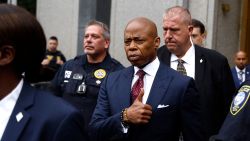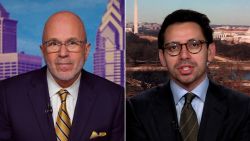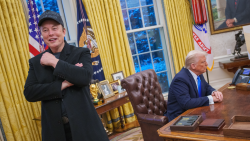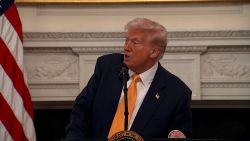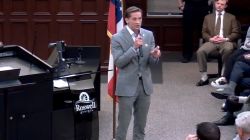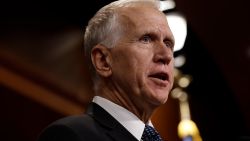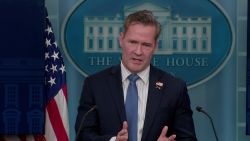The morning after the mass resignation of prosecutors sparked a crisis inside the Trump Justice Department, acting Deputy Attorney General Emil Bove led a meeting with the Justice Department’s public integrity section. His message: They had to choose one career lawyer to file a dismissal of the corruption charges against New York City Mayor Eric Adams, according to three people briefed on the meeting.
Bove didn’t make an explicit threat to fire anyone for refusing – but Thursday’s trail of resignations from prosecutors in New York and the public integrity unit made clear the stakes of the demand.
After Friday’s meeting with Bove, the public integrity lawyers met separately to discuss a strategy. A mass resignation was among the options that was considered, but in the end, most coalesced around picking one person to file the dismissal as a way to end the stand-off, two of the people briefed said.
Late Friday, Bove, along with prosecutors Ed Sullivan and Antoinette Bacon, entered the filing that could end the case after an extraordinary wave of resignations from the Southern District of New York and the Justice Department public integrity section that’s shaken the foundation of a Trump administration that says it wants to end the “weaponization” of DOJ.
Over the past 36 hours, seven prosecutors in New York and Washington – including the Trump-installed acting US attorney in the Southern District of New York and the top career prosecutors overseeing public corruption cases – have resigned rather than carry out the order to dismiss the corruption case against Adams, a Democrat. The prosecutors have decried Bove’s Monday order to drop the charges – which cited in part Adams’ role as mayor helping the Trump administration combat illegal immigration – as a bargain amounting to a “quid pro quo.”
The prosecutors who resigned in New York were not Biden appointees. The acting US attorney for the Southern District, Danielle Sassoon, who was elevated by Trump, clerked for the late Supreme Court Justice Antonin Scalia. And Assistant US Attorney Hagan Scotten, a line prosecutor who resigned in a blistering letter Friday, once clerked for Chief Justice John Roberts.
“Any assistant U.S. attorney would know that our laws and traditions do not allow using the prosecutorial power to influence other citizens, much less elected officials, in this way,” Scotten wrote in his resignation letter on Friday.
“If no lawyer within earshot of the President is willing to give him that advice, then I expect you will eventually find someone who is enough of a fool, or enough of a coward, to file your motion,” Scotten wrote. “But it was never going to be me.”
Interviews with more than a dozen officials in New York and Washington show how the case against Adams – and the refusal to accede to the demand to drop it – has become a flashpoint in a Trump Justice Department that’s led by Attorney General Pam Bondi, who represented Trump at his Senate impeachment trial, and Todd Blanche and Bove, who both defended Trump in his criminal cases.
Bove, who will assume one of the most powerful positions in the department under Blanche, should Blanche be confirmed as deputy attorney general, has been at the forefront of the firings of prosecutors from the Trump criminal cases and the review of thousands of FBI agents who investigated the January 6 attack on the US Capitol. Now he’s caught in the middle of a standoff with the US attorney’s office where he worked for a decade until leaving in 2021.
The Trump DOJ leadership is leaving no doubt as to what it wants.
“The decision to dismiss the indictment of Eric Adams is yet another indication that this DOJ will return to its core function of prosecuting dangerous criminals, not pursuing politically motivated witch hunts,” Justice Department chief of staff Chad Mizelle said in a Friday afternoon memo.
“The fact that those who indicted and prosecuted the case refused to follow a direct command is further proof of the disordered and ulterior motives of the prosecutors,” he added. “Such individuals have no place at DOJ.”
To the bar and back
The public integrity section has seen a target on its back since Trump took office, as the Trump administration has gutted the federal government’s ability to fight public corruption in its first weeks. Senior administration officials have considered eliminating the unit, which was created after Watergate to combat public corruption.
After Sassoon resigned on Thursday, Bove turned to the public integrity unit to carry out his order to dismiss the Adams case. He was met with more resignations.
First came Kevin Driscoll, the top career criminal division prosecutor who oversaw the public integrity section, and John Keller, who had been named the acting head of the unit. After they resigned, the office’s prosecutors gathered at a bar nearby to toast their departing colleagues, according to sources familiar with the matter.
Then another message came: Bove wanted to speak with three more prosecutors from the office.
They returned to the office to jump on a video call with Bove, who told them the Justice Department needed a career public integrity lawyer to file the dismissal of the case against Adams.
The prosecutors initially tried to talk Bove out of forcing them to sign the filing. When Bove insisted, the trio resigned on the spot, people familiar with the discussion told CNN.
Then they returned to the bar.
‘Only if the indictment were dismissed’
The Southern District of New York last year brought public corruption charges against Adams in the first prosecution of a sitting mayor in the city’s modern history. Adams pleaded not guilty, and the case was set to go to trial this spring.
Trump’s reelection changed everything. Three days before Trump was sworn in, Adams traveled down to Mar-a-Lago to meet with Trump, setting off speculation about what was to come in his criminal case. He also accepted a last-minute invitation to the inauguration.
Soon after Trump took office, Adams’ attorneys approached the White House counsel’s office to inquire about a pardon for Adams but never heard back, one person familiar with the matter said.
About one week later, Bove contacted Adams attorney Alex Spiro to set up a meeting. He told him the Justice Department was familiar with the legal arguments and the weaknesses of the case were obvious, one person familiar with the matter said. Bove added they were considering dismissing the charges and wanted to hear from them about how the prosecution was impacting Adams’ ability to do his job and for specific examples of the alleged weaponization of the Justice Department, people familiar with the matter said.
On January 31, Bove convened the meeting in Washington. Bove was the only senior member of the Justice Department present. He was joined by Adams’ attorneys, Spiro and William Burck, as well as Sassoon, Scotten and two others from SDNY.
Adams’ legal team argued the looming criminal charges made it difficult for Adams to lead the city and prepare for trial at the same time, along with as much as two months he would have to sit in a courtroom, the people said.
In her resignation letter, Sassoon wrote that Adams’ attorneys “repeatedly urged what amounted to a quid pro quo, indicating that Adams would be in a position to assist with the Department’s enforcement priorities only if the indictment were dismissed.” She alleged that her colleagues took notes on the meeting but were forced to hand them over to Bove once it concluded.
The mayor’s attorneys also raised recent actions by the former US attorney for the Southern District of New York, Damian Williams, the people said.
Williams had resigned from the US attorney’s office in mid-December and launched a website with color photos and links to press coverage, which has sparked speculation it could be a potential vehicle for a future political campaign.
On January 16, Williams wrote an op-ed for City & State titled, “An indictment of the sad state of New York government,” which Adams attorneys seized on as being part of the politicalization of the case.
Spiro accused Williams of ethical misconduct and violating rules governing what prosecutors can say about cases. He raised it with the trial judge, Dale Ho, who concluded that Williams didn’t violate the rules.
Ho, a Biden appointee, will decide the motion to dismiss the case.
‘The ever-present partner that DHS needs’
After the January 31 meeting, Bove asked SDNY and Adams legal team to submit more information in writing.
Adams’ attorneys asked for an outright dismissal of the case – emphasizing the impact the trial would have on Adams’ ability to lead the city and his “longtime desire to confront the migrant crisis head-on.” The letter even noted that if Adams’ was removed from office, his replacement would be “a frequent outspoken critic of Mayor Adams’s desire to protect New Yorkers by combating the migrant crisis.”
“As his trial grows near, it will be untenable for the Mayor to be the ever-present partner that DHS needs to make New York City as safe as possible,” Spiro wrote.
When Bove issued his directive ordering a dismissal of the case this week he did so without prejudice, meaning the case could be revived in the future after the mayoral election in November 2025.
“The pending prosecution has unduly restricted Mayor Adams’ ability to devote full attention and resources to the illegal immigration and violent crime that escalated under the policies of the prior Administration,” wrote Bove.
His memo noted that the order was issued “without assessing the strength of the evidence or the legal theories on which the case is based,” which Sassoon cited in her decision to defy his order.
The day after being directed to drop the charges, Sassoon told Bove on the phone and Bondi in writing that she would not dismiss the case. She called an “all hands” meeting of her office on Wednesday, but that was abruptly canceled.
A little more than 24 hours later, Sassoon submitted her eight-page resignation letter to Bondi. Moments later, she told her staff in New York that she had submitted her resignation, people familiar with the matter said.
‘You lost sight of the oath’
Last year, Bove and Blanche represented Trump in multiple criminal cases. Now Trump’s criminal defense attorneys are his go-to at the Justice Department.
Blanche and Bove were skeptical of the Adams prosecution from the outset, specifically whether prosecutors could prove Adams intentionally violated campaign finance laws. They view dismissing the case as carrying out Trump’s executive order to review all cases of aggressive prosecutions and the president’s desire to have partners in states to further his political agenda, people familiar with their thinking said.
Soon after arriving at DOJ, Bove asked all US attorney offices to look at cases in their districts where there was overreach, especially on public corruption and business cases, the person said.
In a letter accepting Sassoon’s resignation, Bove defended the decision to drop the case against Adams, arguing Sassoon did not have the right to ignore the policies of the president and the attorney general.
“You lost sight of the oath that you took when you started at the Department of Justice by suggesting that you retain discretion to interpret the Constitution in a manner inconsistent with the policies of a democratically elected President and a Senate-confirmed Attorney General,” Bove wrote.





